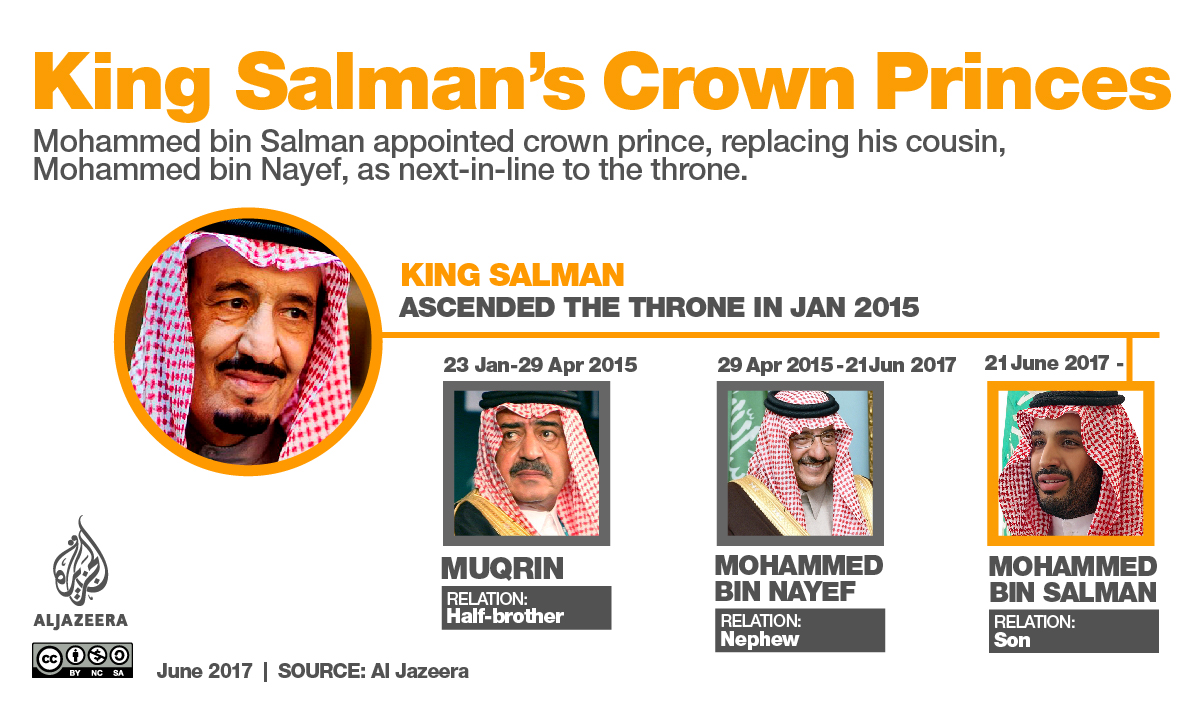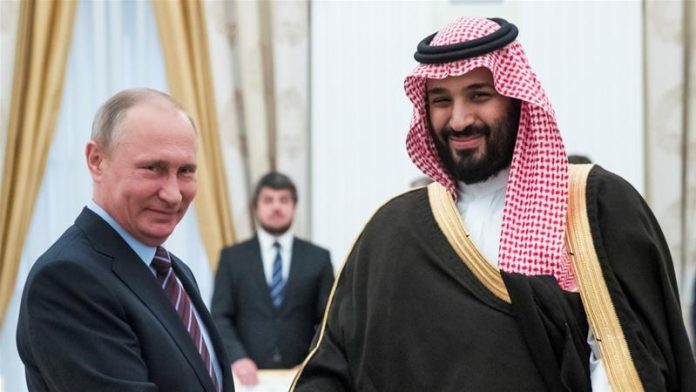Personal ambitions of the Saudi crown prince and financial interests of Russia are going to shape this ‘historic’ visit.
The Russian leadership has been waiting for Saudi King Salman to visit Moscow for a very long time.
An official visit was first mentioned in the first half of 2015, when President Vladimir Putin, during a telephone conversation, invited the newly crowned monarch to Russia. Since then, the king’s visit has been scheduled and postponed several times. In the past six months, the date of Salman’s visit was reviewed three times: first, he was expected to be in Moscow in the middle of July, immediately after the G-20 summit in Hamburg, then in early August and, finally, in October.
|
|
When the dates for Salman’s visit to Moscow was finally confirmed, Saudi Foreign Minister Adel al-Jubair called the visit “historical”. This was a fully justified description as the history of Russian-Saudi relations is very dramatic.
The Soviet Union was the first country to recognise the independence of the state created by King Abdulaziz. It established diplomatic relations with the Kingdom of Hejaz and Nejd (the name of the Saudi state until 1932) in 1926. However, when in 1938 the Soviet leadership executed its envoy to Riyadh, Karim Khakimov, who was a close friend of the Saudi king, the diplomatic relations between the two countries broke down. Relations were only re-established after the dissolution of the Soviet Union and the establishment of the Russian Federation in 1991.
As a result of this long pause in diplomatic relations, and the very difficult period of normalisation that followed, a Saudi king never visited the Soviet Union or the Russian Federation, until today. Faisal visited Moscow when he was still the foreign minister, Abdallah went there when he was the crown prince and even Salman himself visited the country when he was the emir of Riyadh, but today marks the first Saudi royal visit to Russia in history.
OPINION: The Russian-Saudi rapprochement and Iran
However, we should not expect any “breakthrough” decisions or agreements at the end of this “historic” visit. The limits of Russian-Saudi cooperation are obvious, as the two countries do not see eye to eye on many fundamental issues. They have developed economic ties over the last few decades, but these ties are not strong enough to transform the limited cooperation between the two countries into a partnership or alliance. Moreover, the export markets of Russia and Saudi Arabia are very similar, which makes it difficult for them to increase the volume of trade between the two countries any further.
|
In many respects, the relative normalisation of Russian-Saudi relations that we are witnessing today is the result of extreme pragmatism and willingness to repress ideological differences on both sides. |
Yet, Saudi Arabia’s young Crown Prince Mohammad bin Salman was still right when he said during his last trip to Moscow in May 2017 that “the relationship between Saudi Arabia and Russia is going through one of the best moments.” In the last two years, the crown prince personally worked towards ameliorating relations between the two countries and had a certain level of success. He regularly engaged in dialogue with Moscow, and he kept the communication channels open even when Russia began its military campaign in Syria and Saudi Arabia bogged down in the Yemeni crisis. From this point of view, the current easing of tensions between the countries, in spite of their conflicting regional interests, is largely due to Mohammad bin Salman’s efforts.
The crown prince factor
In many respects, the relative normalisation of Russian-Saudi relations that we are witnessing today is the result of extreme pragmatism and willingness to repress ideological differences on both sides. Both Crown Prince Muhammad bin Salman and the Russian leadership have personal interests in developing the relations between the two countries.
First of all, the Saudi crown prince needs to strengthen his political position at home and he views Russia as an actor that can help him achieve this goal. When Mohammed bin Salman initiated the “Vision 2030” reforms, he signalled a change in the traditional way of life in Saudi Arabia and an exit from the country’s economic “comfort zone”. By doing this, the young crown prince risked alienating not only the Muslim clergy and the Saudi elites, but also broad sections of the Saudi population, who feared that they would bear the costs of these unpopular economic reforms.
Therefore, securing a painless transfer of power from King Salman to his son, Mohammad bin Salman, is a key issue for the kingdom at this point in time. King Salman’s authority is respected among the members of the dynasty, but it is hard to make the same claim for the crown prince, who built his political career on striking not fully established or accepted rules and reforms. As a result, the crown prince desperately needs foreign policy victories to win domestic support. So far, he failed to achieve this in the war in Yemen or in the confrontation with Qatar, but he is now hoping to show his diplomatic talent by increasing the kingdom’s cooperation with Moscow.
OPINION: Russia and the GCC crisis
Undoubtedly King Salman and Vladimir Putin will be discussing the conflict in Syriaduring their meeting in Moscow. Russia has repeatedly stated that it highly appreciates the role Saudi Arabia played in the signing of the Cairo agreements which foresaw the establishment of a full ceasefire in Eastern Ghouta. In this regard, it is likely that at the end of this meeting, Riyadh will be able to convince Moscow to guarantee seats for opposition representatives loyal to Saudi Arabia in the future Syrian government. Such a guarantee would help the crown prince to strengthen his diplomatic credentials at home.
Yemen, where Saudi Arabia still counts on Moscow’s loyalty, is no less important for Muhammad bin Salman. Since the beginning of the Saudi military operation in Yemen in March 2015, the Russian leadership has tried to refrain from categorical comments on Yemen, supporting, de facto, the efforts undertaken by Riyadh. It is now being argued that, following the meeting in Moscow, the Russian leadership will confirm its intention not to prevent the Saudis from taking further steps in resolving the Yemeni conflict, once again helping the crown prince to claim a foreign policy victory.
Moscow’s financial interests
In turn, Moscow is interested in strengthening the financial component of Russian-Saudi relations. The Russian leadership has repeatedly expressed its dissatisfaction with the fact that most of the agreements affecting economic, as well as military-technical cooperation remain at the Memoranda of Understanding (MoU) level. The only exception to this rule is the agreement reached within the framework of OPEC on the reduction of oil production and stabilisation of oil prices.
In Moscow, it is expected that King Salman’s visit will put an end to the era of non-committal agreements.The parties are expected to sign the first contract for the supply of Russian arms to Saudi Arabia. The general terms of this $3.5bn contract were agreed upon this summer.
Another project in which the Russian authorities are interested, maybe the participation of Russia’s Rosneft in the partial privatisation of the Saudi Aramco, which was announced to take place in 2018.
King Salman’s Moscow visit may also mark a turning point for the desired influx of Saudi investment into Russia. This summer, the Saudi ambassador to Russia, Ibrahim al-Rassi, visited a number of North Caucasian republics, where he assessed their investment attractiveness for the kingdom. Moreover, it is expected that the Saudi Public Investment Fund would launch its representative office in Russia following the results of the meeting.
Howbeit, Russia and Saudi Arabia are beginning to value relations with each other more, preferring pragmatic cooperation to costs from ideological confrontation.
 |
Leonid Issaev is a Lecturer at the Higher School of Economics
































